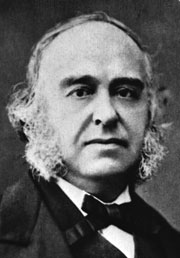Paul Broca
From Psy3241
| (4 intermediate revisions not shown) | |||
| Line 1: | Line 1: | ||
| - | [[Category:Neuropsychological profiles]] | + | [[Category:Neuropsychological profiles]][[Image:paul broca.jpg]] |
| Line 6: | Line 6: | ||
1824-1880 | 1824-1880 | ||
| - | Born in France June 28, 1824, Broca was a pathologist, early neurosurgeon, and anthropologist. His neurosurgical contributions are most relevant to the class. | + | Born in France June 28, 1824, Pierre Paul Broca was a pathologist, early neurosurgeon, and anthropologist. His neurosurgical contributions are most relevant to the class. |
== Contributions to Modern Medicine == | == Contributions to Modern Medicine == | ||
| - | Broca is considered the founder of modern brain surgery. He accurately described muscular dystrophy, rickets, and the spread of cancer before other experts. | + | Broca is considered the founder of modern brain surgery. He accurately described muscular dystrophy, rickets, and the spread of cancer before other experts. He discovered left hemisphere dominance for speech, and localized the area in what is now known as [[Broca's area]]. Broca used the case of a patient known as [[Tan (aphasia patient)]] to further support his theory of speech localization in the brain. Broca's contributions set the framework for modern research into the investigation of localization for other functions of the brain. |
Current revision as of 01:50, 29 April 2008
Introduction
1824-1880
Born in France June 28, 1824, Pierre Paul Broca was a pathologist, early neurosurgeon, and anthropologist. His neurosurgical contributions are most relevant to the class.
Contributions to Modern Medicine
Broca is considered the founder of modern brain surgery. He accurately described muscular dystrophy, rickets, and the spread of cancer before other experts. He discovered left hemisphere dominance for speech, and localized the area in what is now known as Broca's area. Broca used the case of a patient known as Tan (aphasia patient) to further support his theory of speech localization in the brain. Broca's contributions set the framework for modern research into the investigation of localization for other functions of the brain.

